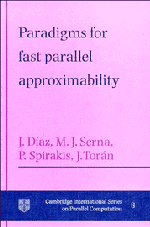Book contents
- Frontmatter
- Contents
- Preface
- 1 Introduction
- 2 Basic Concepts
- 3 Extremal Graph Properties
- 4 Rounding, Interval Partitioning and Separation
- 5 Primal-Dual Method
- 6 Graph Decomposition
- 7 Further Parallel Approximations
- 8 Non-Approximability
- 9 Syntactically Defined Classes
- Appendix 1 Definition of Problems
- Bibliography
- Author index
- Subject index
5 - Primal-Dual Method
Published online by Cambridge University Press: 19 March 2010
- Frontmatter
- Contents
- Preface
- 1 Introduction
- 2 Basic Concepts
- 3 Extremal Graph Properties
- 4 Rounding, Interval Partitioning and Separation
- 5 Primal-Dual Method
- 6 Graph Decomposition
- 7 Further Parallel Approximations
- 8 Non-Approximability
- 9 Syntactically Defined Classes
- Appendix 1 Definition of Problems
- Bibliography
- Author index
- Subject index
Summary
The linear programming primal-dual method has been extensively used to obtain sequential exact algorithms (see for example [Chv79], [PS82]). This algorithm keeps both a primal solution and a dual solution. When the solutions together satisfy the complementary slackness conditions, then they are mutually optimal. Otherwise either the primal solution is augmented or the dual solution is improved. The primal-dual method was originally due to Dantzing, Ford and Fulkerson [DFF56]. Unless P=NP, the primaldual method cannot be used to solve exactly in polynomial time NP-hard problems.
The primal-dual framework has been particularly useful to obtain polynomial time approximation algorithms for some NP-hard combinatorial optimization problems (see for example the forthcoming survey by Goemans and Williamson [GW96]). For those problems that can be formulated as integer programming problems, the approach works with the linear programming relaxation and its dual, and seeks for an integral extension of the linear programming solution. Furthermore the use of the combinatorial structure of each problem determines how to design the improvement steps\ and how to carry on the proof of approximation guarantee. There is no general primal-dual approximate technique; however, some approaches can be seen as producing both primal and dual feasible solutions, until some conditions are met. Those last conditions insure that the values of the primal and dual solutions are within 1 + ε of each other. As the optima of the primal and dual problems are the same, the primal and dual feasible solutions produced by the algorithm have a value within 1 + ε of optimal value.
- Type
- Chapter
- Information
- Paradigms for Fast Parallel Approximability , pp. 55 - 67Publisher: Cambridge University PressPrint publication year: 1997



